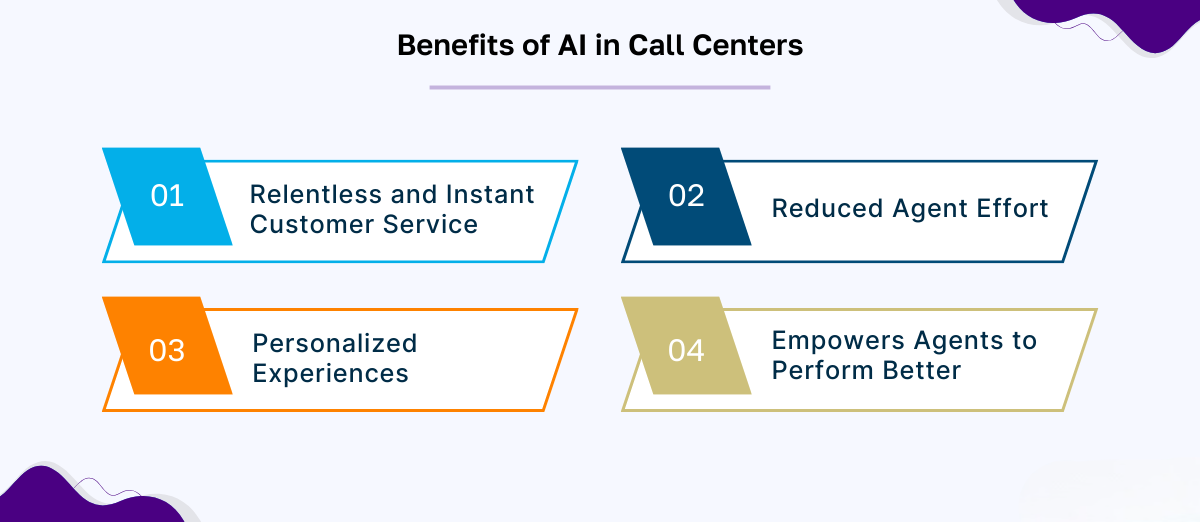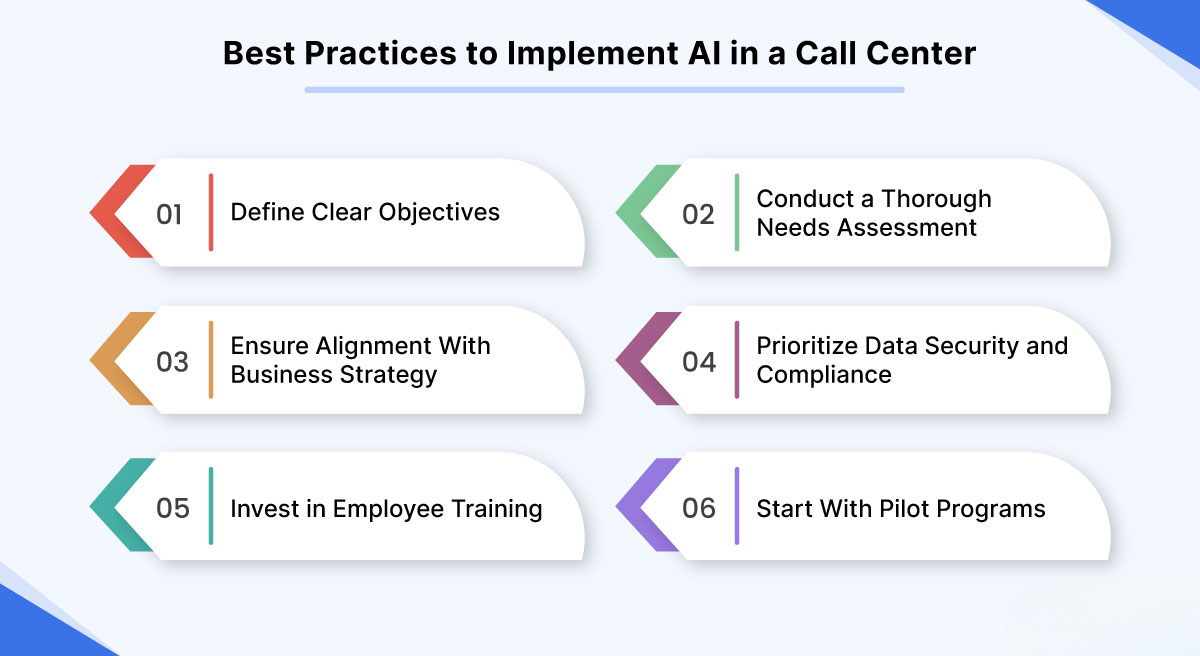Customer service is undergoing a major transformation, and artificial intelligence (AI) call center technology is leading the way. Businesses worldwide, including in the UAE and across the GCC are integrating AI into their support systems to enhance efficiency, reduce operational costs, and elevate customer experiences.
Traditional call centers have long struggled with inefficiencies such as high call volumes, extended wait times, inconsistent service quality, and employee burnout. These challenges have pushed companies to explore AI call centers for customer services, which streamline processes and ensure better customer satisfaction while providing quick and accurate responses.
AI-powered call centers leverage cutting-edge technologies such as natural language processing (NLP), machine learning, and speech recognition to interact with customers in real-time. These AI-driven solutions can analyze customer queries, understand emotions, and provide responses with unprecedented accuracy and speed.
By reducing the dependency on human agents for repetitive tasks, AI allows businesses to free up human resources for complex problem-solving while providing round-the-clock support.
A recent Deloitte survey revealed that 62% of organizations using AI-powered contact center tools saw a 25% reduction in average handle times, while customer satisfaction scores improved by 20–30%.
For UAE-based businesses, where expectations are high and multilingual support is essential, partnering with the best digital transformation agency can help organizations seamlessly implement AI-driven call center technologies.
Such agencies not only provide the technical expertise but also ensure that AI adoption aligns with business goals, customer needs, and long-term growth strategies.
What Are AI Call Centers?
An AI call center is a customer service center powered by AI technologies like machine learning, natural language processing (NLP), and automation tools. These call centers are designed to handle customer interactions in a more efficient and intelligent manner, either by assisting human agents or completely managing customer service inquiries without any human involvement.

AI-driven solutions in call centers can take various forms, including automated voice assistants, chatbots, virtual agents, and advanced predictive analytics. These technologies allow businesses to provide 24/7 customer support, handle multiple requests simultaneously, and reduce operational costs.
4 Key Benefits of AI-Powered Call Centers
The adoption of artificial intelligence call centers for customer services, the technology is transforming the way businesses handle customer service. AI-driven automation enhances efficiency, reduces costs, and improves the overall customer experience.

By integrating AI into call centers, businesses can optimize their support operations while ensuring customers receive fast, accurate, and personalized assistance.
With the increasing demand for instant customer service, AI-powered tools have become essential in meeting expectations and delivering seamless support.
| Key Benefit | Description |
|---|---|
| Increased Efficiency & Faster Response Times | AI chatbots and virtual assistants handle multiple inquiries at once, reducing wait times and managing peak call volumes without extra staff. |
| Cost Savings & Improved ROI | Automation reduces workforce needs for routine tasks, improves first-call resolution, lowers costs, and boosts ROI. |
| Personalized Customer Interactions | Machine learning personalizes interactions by analyzing history, preferences, and behavior, offering tailored recommendations. |
| 24/7 Availability & Omnichannel Support | AI ensures round-the-clock support across channels (chat, phone, email, social media), maintaining seamless experiences. |
| Data-Driven Insights & Predictive Analytics | AI analyzes customer interactions, detects sentiment in real time, and predicts future needs to enhance proactive service. |
3 Examples of AI in a Call Center
Here are three real-world examples of how AI is transforming contact centers across different industries.
1. Emirates NBD (Banking & Finance – UAE)
One of the largest banks in the Middle East, Emirates NBD uses AI-powered chatbots and voice assistants to provide multilingual customer support. The AI call centers for customer services handle thousands of daily inquiries, from balance checks to fraud alerts, reducing wait times and freeing agents to focus on complex financial cases.
2. Mayo Clinic (Healthcare – USA)
The Mayo Clinic leverages AI-driven contact center technology to manage patient scheduling, answer medical queries, and provide triage support. AI helps route urgent cases directly to healthcare staff while automating routine appointment requests, resulting in reduced call abandonment and better patient experiences.
3. Vodafone (Telecommunications – Global)
Vodafone employs AI-powered virtual assistants across its contact centers to assist customers with billing, data plans, and technical troubleshooting. The system processes millions of interactions monthly, cutting average handle times and increasing customer satisfaction, especially in multilingual markets.
Emerging AI Innovations in Call Centers
As AI technology matures, its applications in call centers are becoming more advanced and impactful. One question that arises is Did AI Make Foreign Workers in Tech Obsolete? While AI improves efficiency and reduces the need for human labor in some areas, it is not making foreign workers in tech obsolete. Instead, AI is creating new opportunities for workers to collaborate with machines, focusing on more complex and value-added tasks, while automating routine inquiries. Beyond simple chatbots and automation, today’s AI contact center technology is focused on creating seamless, human-like interactions, empowering agents with smarter tools, and building hybrid models that balance efficiency with empathy.
These emerging technologies are setting the stage for the next generation of customer service.
1. Generative AI & LLMs
Large Language Models enable more natural, human-like conversations instead of rigid scripts. They understand context, remember past interactions, and provide personalized responses, much like marketers calculating Google ads cost to optimize campaigns in real time.
With LLMs, AI call centers for customer services can create tailored experiences that better engage customers, respond more accurately, and enhance overall service quality.
2. AI-Enhanced IVR
Intelligent voice recognition replaces frustrating menu-based systems with conversational IVR. Customers can explain their issue in plain language and get routed instantly to the right department, which parallels how beginners research how to get into digital marketing by starting with tools that simplify complex processes.
3. Agent Coaching & Feedback
AI assists agents in real time by suggesting responses, highlighting upsell opportunities, and detecting customer frustration. It also reviews past calls to give data-driven coaching, similar to how businesses rely on the best SEO reporting tools to analyze performance and refine future strategies.
4. Hybrid Human + AI Models
Bots handle routine queries quickly, while complex or sensitive cases are seamlessly escalated to human agents. This balance ensures both efficiency and empathy.
Explore Our Digital Transformation Services!
5 Challenges and Ethical Considerations of AI in Call Centers
While the adoption of artificial intelligence for call center technology is transforming customer service, it also comes with significant challenges and ethical concerns.
Businesses must carefully navigate these hurdles to ensure that AI enhances rather than disrupts the customer experience.
From maintaining human empathy in AI interactions to addressing data security risks, companies must implement AI responsibly while balancing efficiency and ethical considerations.
1. Lack of Human Empathy in AI Interactions
One of the biggest limitations of AI-powered customer service is the absence of human empathy. While AI chatbots and virtual assistants can analyze text and voice inputs to provide logical responses, they often struggle to understand emotional nuances, much like how AI SEO software can process data but still lacks human creativity and intuition.
Customers frequently reach out to call centers when they are frustrated, confused, or seeking reassurance. In these situations, a purely automated response can feel robotic, leaving customers dissatisfied and unheard.
This is especially concerning in sensitive industries such as healthcare, finance, and insurance, where compassionate and personalized interactions are critical.
In fact, customer trust here is as important as asking is affiliate marketing legit when evaluating online business models.
While AI-powered sentiment analysis can detect frustration, urgency, or anger, it still cannot replace the ability of a human agent to empathize, comfort, and reassure.
For this reason, businesses adopting call center AI services must strike the right balance between automation and human support.
AI should be positioned as an assistant that enhances service efficiency, while human agents remain central to handling emotionally sensitive conversations.
2. Data Security and Privacy Concerns
AI-powered call centers process vast amounts of customer data, making data privacy and security a major concern. AI-driven systems collect personal information, payment details, and confidential customer records, creating potential risks for data breaches, hacking, and misuse of information.
To maintain customer trust, businesses must implement strong data protection protocols and comply with global privacy regulations such as GDPR (General Data Protection Regulation) and CCPA (California Consumer Privacy Act).
Companies should also adopt encryption, secure access controls, and AI-driven fraud detection systems to prevent cyber threats.
Additionally, AI models must be trained to handle customer data responsibly. Companies should establish clear guidelines on data collection, storage, and usage, ensuring that customer interactions are not exploited for unauthorized advertising, profiling, or resale to third parties.
Transparency in AI decision-making and data processing is crucial to building consumer confidence in AI-powered customer service.
To learn more about how businesses can maintain transparency in AI-driven operations, read transparency in digital marketing.
3. AI Bias and Ethical Dilemmas
AI systems are only as unbiased and fair as the data they are trained on. If Artificial Intelligence call center models are developed using biased datasets, they can unintentionally favor certain demographics while discriminating against others.
For instance, if an AI-powered chatbot has been trained primarily on English-speaking customer interactions, it may struggle to provide accurate support to non-English speakers or customers with regional accents.
Similarly, AI-driven fraud detection systems in financial services have been criticized for unfairly flagging transactions from specific locations, leading to unjustified account suspensions, a debate that feels as relevant as comparing Duckduckgo vs Google, where data handling and fairness are critical considerations.
Addressing AI bias in call centers requires businesses to:
- Regularly audit AI algorithms for biased decision-making.
- Ensure diverse and representative training datasets.
- Implement human oversight in AI-generated recommendations.
Companies must recognize that ethical AI deployment is not just a technical issue but a moral obligation. By minimizing AI bias, businesses can ensure fair and inclusive customer service experiences.
4. Integration Challenges with Legacy Call Center Systems
Many businesses operate traditional call center infrastructure that may not be compatible with modern AI solutions. The transition from manual call handling to AI-powered automation requires investment in new software, cloud-based services, and employee training.
One major challenge is ensuring seamless integration between AI-driven tools and existing CRM (Customer Relationship Management) platforms. AI models must be able to access, update, and analyze historical customer data without disrupting operations.
This often raises the same type of questions companies ask when evaluating what is an SEO company is, where expertise and the right technology stack make all the difference in achieving results.
However, outdated legacy systems often lack the flexibility to integrate with AI-powered voice assistants, chatbots, and predictive analytics tools.
To overcome these obstacles, businesses must:
- Upgrade to cloud-based call center platforms for easier AI integration.
- Train employees to work alongside AI assistants rather than view them as a replacement.
- Conduct regular system updates and security patches to ensure AI runs optimally.
5. Customer Resistance and Trust Issues
Despite AI’s growing capabilities, many customers still prefer human interaction over AI-powered assistance. Studies indicate that a significant percentage of users find chatbots frustrating, especially when they fail to understand complex inquiries or offer generic responses.
Common customer complaints about AI-driven call centers include:
- Inability to escalate issues efficiently to a human agent.
- Repetitive or irrelevant responses from chatbots.
- Lack of flexibility in handling unique problems.
To build trust in AI-powered call center solutions, businesses must ensure:
- Clear communication that AI is being used to enhance, not replace, human agents.
- Easy escalation options for customers who need human assistance.
- Regular improvements to AI responses based on real customer interactions.
By positioning AI as a support tool rather than a replacement, companies can improve customer acceptance and satisfaction levels.
6 Best Practices to Implement AI in a Call Center
Artificial Intelligence (AI) is transforming call centers worldwide by improving efficiency, reducing costs, and enhancing customer experiences. However, successful implementation requires careful planning and strategy. Here are six best practices to ensure AI delivers real value in your call center.

1. Define Clear Objectives
Before implementing AI, it’s important to identify what you want to achieve. Are you aiming to reduce call handling times, improve customer satisfaction, or automate repetitive queries? Defining clear goals helps you select the right AI tools and measure success effectively.
2. Conduct a Thorough Needs Assessment
Not all call centers face the same challenges. Conduct a comprehensive needs assessment to identify pain points, customer expectations, and areas where AI can have the most impact. For instance, AI chatbots may be more beneficial in handling FAQs, while predictive analytics may help with workforce management.
3. Ensure Alignment With Business Strategy
AI adoption should support your larger business strategy. If your brand emphasizes premium customer service, your AI tools should improve personalization, not just efficiency. This is like how web design and development projects must align with a company’s brand identity and long-term goals for consistency.
4. Prioritize Data Security and Compliance
AI systems handle sensitive customer data, so data privacy and compliance must be top priorities. Make sure your AI solutions comply with industry regulations (like GDPR, HIPAA, or PCI DSS) and implement strong cybersecurity practices to build customer trust.
5. Invest in Employee Training
AI doesn’t replace employees, it empowers them. Training your team to work alongside AI tools is crucial. Agents should understand how AI assists them, from providing real-time suggestions to automating routine tasks. This reduces resistance to change and increases adoption success, much like how ecommerce marketing teams are trained to leverage digital tools and analytics for better performance.
6. Start With Pilot Programs
Instead of a full-scale rollout, begin with pilot programs. Test AI solutions in smaller areas of your call center operations. Gather feedback, analyze performance, and refine the system before expanding. This phased approach minimizes risks and ensures smoother implementation.
The Future of AI in Call Centers for Better Customer Service
The future of AI in call centers for customer services is not about replacing human agents but about fostering a powerful collaboration between advanced technology and human empathy. AI will streamline repetitive, high-volume tasks like answering frequently asked questions, processing payments, and handling routine account inquiries, allowing for faster, more efficient service.
This enables human agents to focus on their strengths, providing emotional intelligence, solving complex problems, and cultivating meaningful customer relationships.
The result? Customers experience quicker resolutions for simple queries, while still benefiting from the personal touch that only humans can provide in more complex interactions. Companies that integrate AI with human expertise in their call centers can offer a smarter, more tailored customer experience.
In regions like the UAE and GCC, where expectations are exceptionally high and multilingual support is crucial, early adoption of AI-driven call center technology will offer companies a competitive edge.
In the end, the future of AI in call centers for better customer service is about creating customer experiences that are not only faster and more efficient but also more empathetic and human-centered than ever before.
FAQs: AI Call Centers For Customer Services
How is AI transforming call centers?
AI is revolutionizing call centers by automating routine tasks, minimizing wait times, and offering tailored, real-time assistance. This enhances operational efficiency, reduces costs, and elevates the overall customer experience.
Will AI replace human agents in the future of contact center AI?
No, AI is not meant to replace human agents. Instead, it works alongside them, managing simple inquiries while human agents handle more intricate, emotional, and complex cases. This creates a hybrid approach that merges automation with the human element.
What are the benefits of using contact center artificial intelligence services?
The main advantages include quicker response times, lower operational expenses, enhanced customer satisfaction, predictive analytics, and continuous omnichannel support across platforms such as chat, phone, email, and social media.
How does AI-powered call routing improve customer service?
AI-driven call routing utilizes speech recognition and sentiment analysis to gauge the customer’s intent and urgency. This allows for direct connection to the appropriate department or agent, eliminating the need for outdated menu-driven systems.
What is the future of AI in contact centers?
The future of AI in contact centers will see the integration of cutting-edge technologies like generative AI, conversational IVR, and real-time agent support. These developments will lead to faster, smarter, and more human-like customer service, especially in regions like the UAE and GCC, where multilingual support is essential.
How secure is customer data in AI call centers?
AI-powered call centers adhere to strict privacy laws such as GDPR and CCPA, incorporating encryption, fraud detection, and secure access measures. Businesses must also prioritize transparency and ethical data handling to maintain customer trust.
Conclusion: The Future of AI in Call Centers
The adoption of AI call centers for customer services is no longer a futuristic concept; it is the present and future of customer service. AI call center solutions for customer services are transforming how businesses interact with customers by enhancing efficiency, reducing costs, and delivering personalized experiences.
While AI offers undeniable advantages, it is not intended to replace human agents. Instead, it serves as a complementary tool that enhances their capabilities.
The future of AI call centers for customer services will likely involve a hybrid approach, where AI handles routine inquiries, while human agents focus on complex and emotionally sensitive interactions.
As AI continues to evolve, businesses that embrace AI call centers for customer services will gain a competitive advantage, delivering world-class customer service while improving both efficiency and satisfaction.








